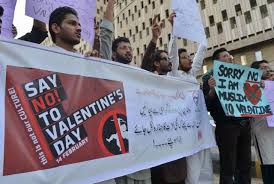February has long been acknowledged as the month of love, with Valentine’s Day falling on the 14th of the month.
In many nations, individuals commemorate this occasion by gifting chocolate, flowers, and cards to their loved ones.
However, a few countries prohibit the observance of Valentine’s Day since it is not part of their religion.
Here is a list of those countries in the world that do not celebrate Valentine’s Day and the reasons:
READ ALSO
Valentine’s Day: “Be Sexually Responsible” – NACA
1. Saudi Arabia
Saudi Arabia is a Muslim country located in Southwest Asia that occupies the majority of the Arabian Peninsula. Valentine’s Day is in violation of Saudi Arabia’s ideology where public expressions of affection are forbidden.
There are numerous foreign Christian workers in Saudi Arabia. Although foreigners are welcome to enter and work in this prosperous economy, they are not allowed to practice their religion here. As a result, on February 14th, all Valentine’s Day-related activity, such as the sale of red roses or teddy bears, was outlawed.
2. Uzbekistan
Uzbekistan is well-known for its long history and diversified culture, with Islam being the predominant religion. For many years, the government tolerated Valentine’s Day celebrations until 2012, when the Ministry of Education’s Department of Enlightenment and the Promotion of Values issued an internal regulation prohibiting such celebrations.
Instead of Valentine’s Day, people in Uzbekistan commemorate the birthday of their country’s hero, Babur, the Mughal Emperor. Valentine’s Day is not banned, although it is greatly discouraged in favor of honoring Babur.
3. Indonesia
In truth, no legislation in Indonesia officially prohibits the day’s commemoration. However, in other sections of the country, such as Surabaya and Makassar, where people hold more extremist Muslim views, intimidation techniques or small-scale prohibitions are used, and Bando Aceh has an entire ban.
In recent years, there have been various protests stating that Valentine’s Day promotes casual premarital sex and alcohol usage, both of which are absolutely prohibited by Islamic law. Despite this, young people in Jakarta continue to openly and enthusiastically celebrate the day.
4. Iran
Iran is an Islamic nation run by religious leaders. The government has banned the production of all Valentine’s Day gifts and goods. The marketing of this romantic love event is also prohibited because it is viewed as a spread of Western culture.
A proposal has been made to replace Valentine’s Day with Mehregan, an ancient Iranian celebration that predates Islam. This event honors Yazata Mehr, who is responsible for friendship, love, and affection.
5. Pakistan
Pakistan, home to the world’s second-largest Muslim population, has conflicting sentiments about Valentine’s Day. As the popularity of Valentine’s Day among the younger generation grows, multiple riots have broken out in this country to condemn the celebration.
A private citizen petitioned the High Court of Islamabad to get the day banned. Finally, on February 7th, 2018, the Islamabad High Court prohibited Valentine’s Day celebrations and media coverage, citing a Western cultural import that opposed Islamic teachings. Not everyone in Pakistan supports this choice, particularly university students and flower vendors who performed well on Valentine’s Day.
6. Malaysia
Since 2005, Malaysia’s Islamic authorities have issued a fatwa (religious judgment) forbidding the observance of Valentine’s Day. This day is accused for leading to disaster and moral degradation among young people. Every year, there is an anti-Valentine’s Day campaign. People who go out to celebrate may risk being detained.






















 You can install this WP plugin on your website from the WordPress official website:
You can install this WP plugin on your website from the WordPress official website: 